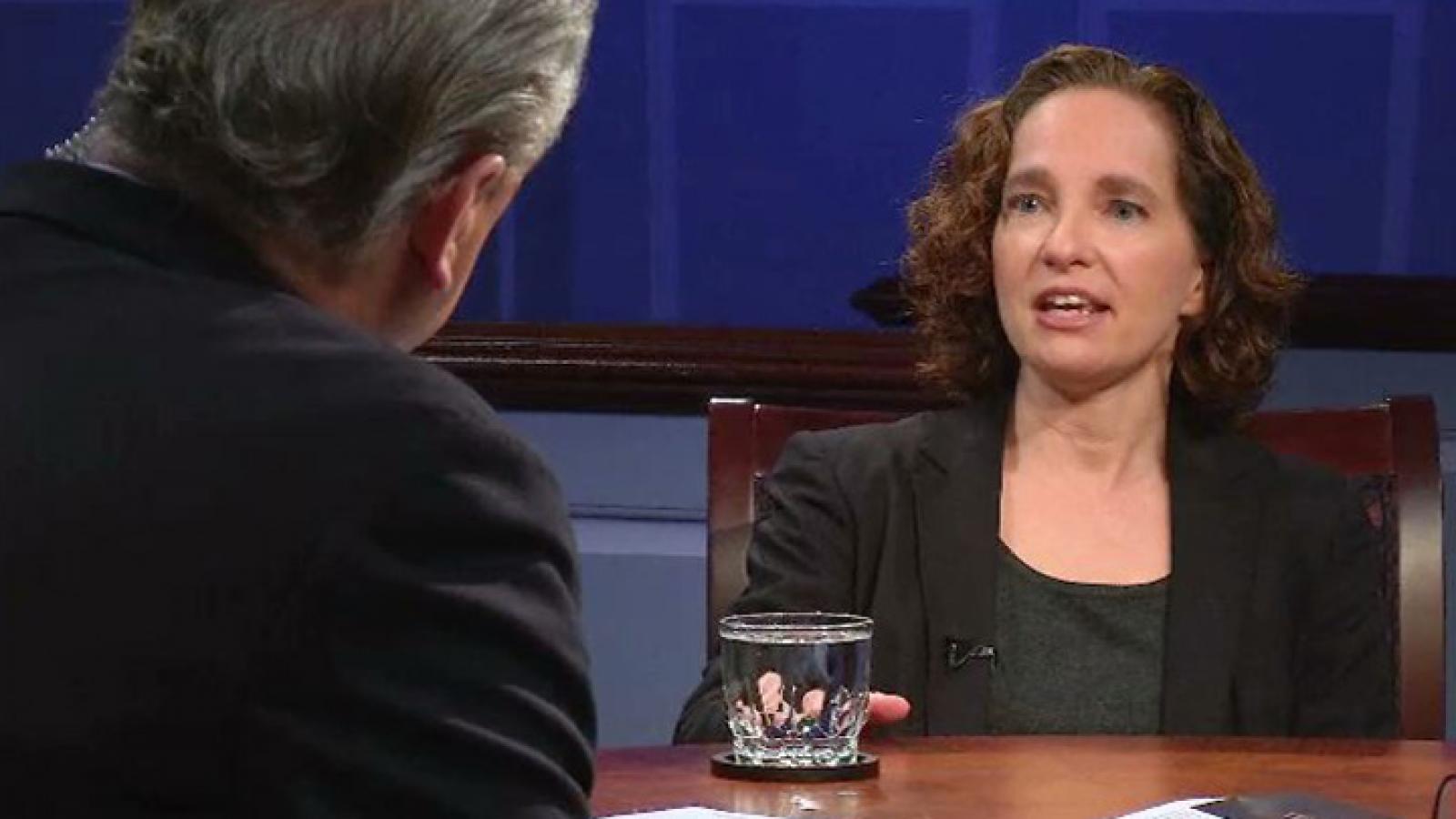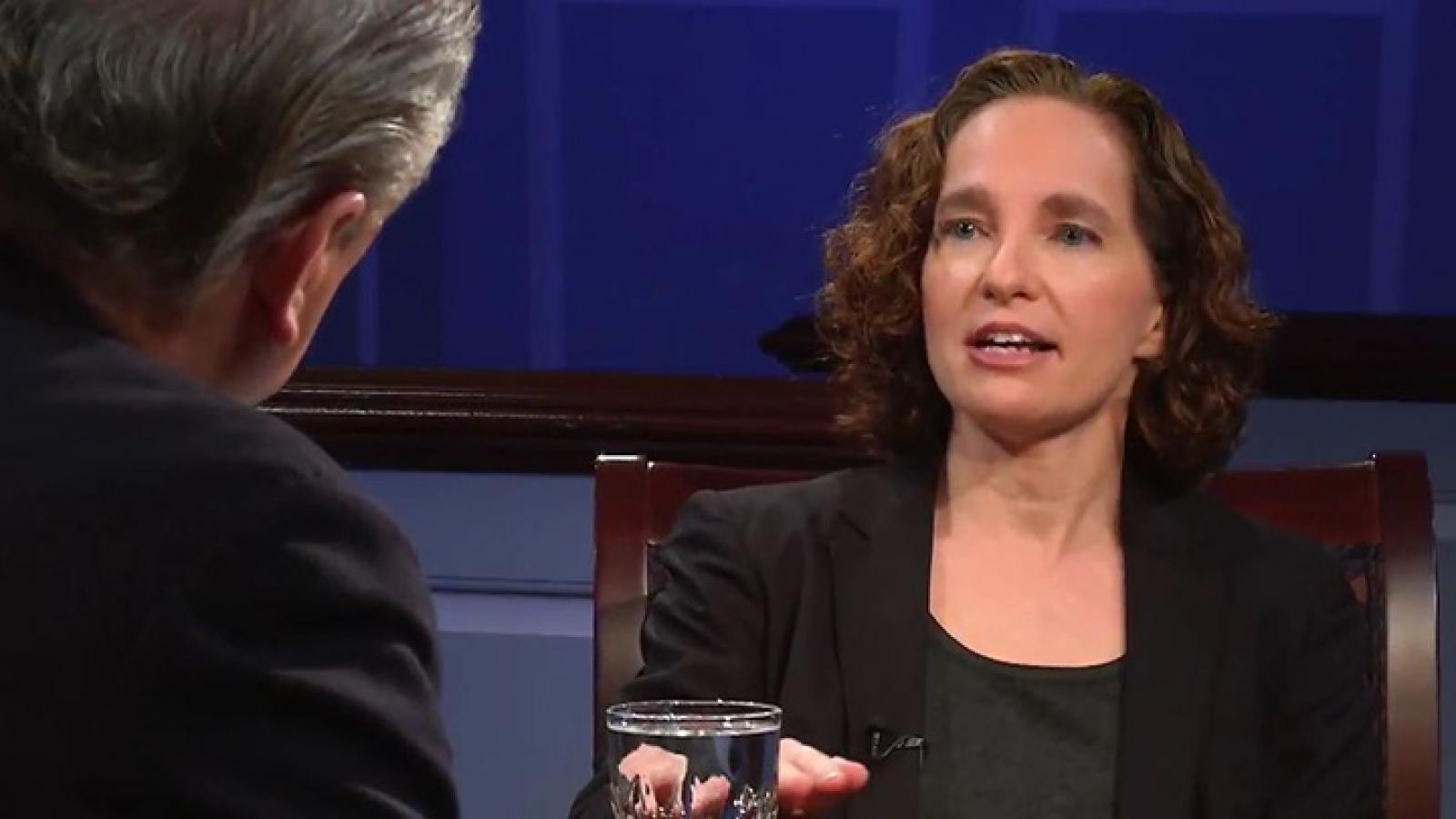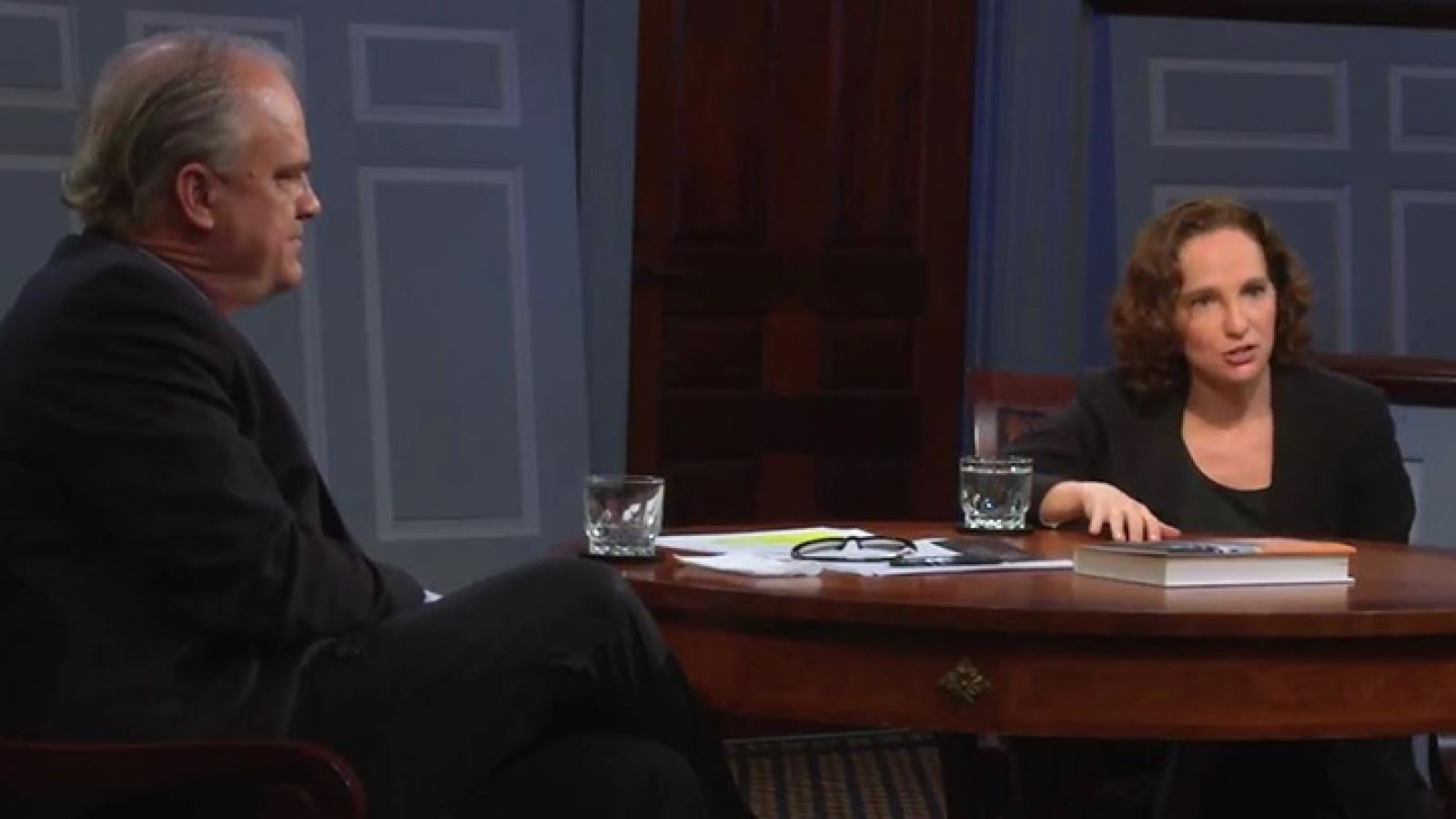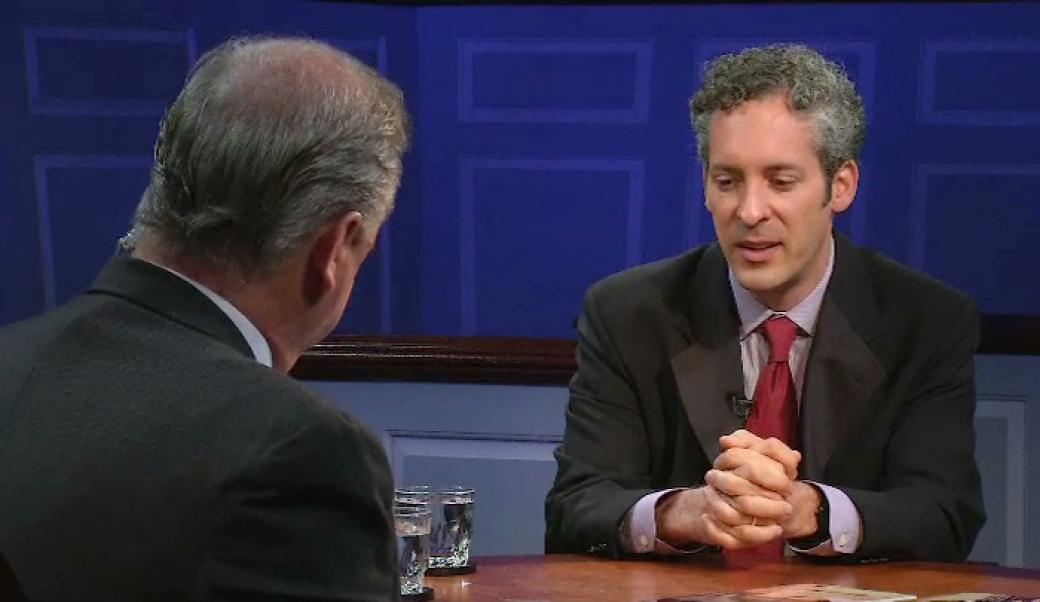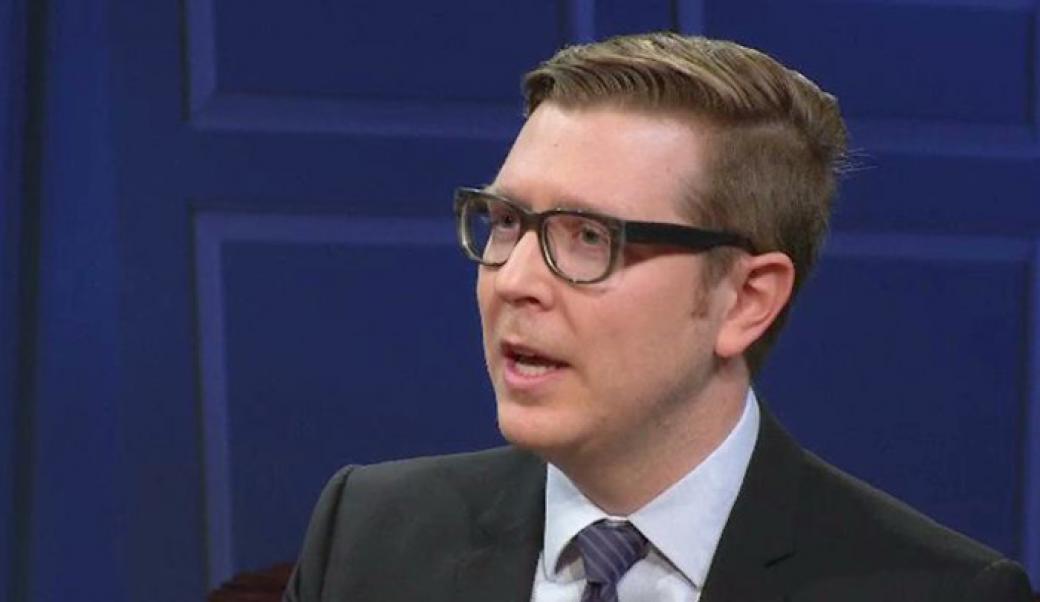About this episode
April 12, 2016
Risa Goluboff
Risa Goluboff, the dean of the UVA School of Law, discusses how laws aimed at criminalizing hoboes and beggars became instruments for social control—and how those laws were quietly dismantled by the U.S. Supreme Court in the 1960s and 1970s.
Transcript
00:41 Blackmon: Welcome back to American Forum. No domestic issue has been more dramatically at the center of American public discussion in recent years than the interplay between police practices, civil rights and racial unrest. We’ve struggled through turmoil around the deaths of Trayvon Martin and so many others. The civil strife in Ferguson Missouri and Baltimore. And there’s little doubt that this will remain a central dilemma in national life through the rest of the current presidency and into the next. But this struggle isn’t new. At the heart of it is an age-old tension over just how much discretion the police should have over who they can stop for questioning, and under what circumstances citizens can be detained. Does giving the police wide latitude to hold suspects, or “Stop-and-Frisk” anyone they want, help law enforcement to more effectively combat crime? Or does that flexibility lead to abuses that reflect the prejudices of our society, or a desire to oppress less popular groups of people?
FACTOID: 2013: NYC’s “Stop and Frisk” found to violate equal protection clause
Our guest today is one of the country’s very brightest young legal scholars. Risa Goluboff is a distinguished professor of Law and History and was recently named to become Dean of the University of Virginia School of Law. She’s written a book that probes a shadowy part of our past: How laws aimed at criminalizing hoboes and beggars became over the course of 400 years, an instrument for massive abuse of police power—and finally how those laws were quietly dismantled by the U.S. Supreme Court in the 1960s and 1970s. It’s a legal history with deep implications for our current national debate. Her book is Vagrant Nation: Police Power, Constitutional Change, and the Making of the 1960s. Risa, thanks for joining us.
FACTOID: The Question: Did old “vagrancy” laws set stage for police crisis?
Goluboff: Thanks for having me Doug.
Blackmon: So vagrancy is kind of an ugly word. What are we really talking about?
Goluboff: So vagrancy laws originate in Elizabethan England in the sixteenth century. They have their roots going back even further than that. And originally vagrancy laws were intended to make sure that everyone who could work would work. So they made it a crime to be poor and idle. But over time they varied and they came to criminalize lots of other kinds of people. So there was a law in the books in 1972, the one that the Supreme Court strikes down, from Jacksonville, Florida and it begins, “rogues and vagabonds or dissolute persons who go about begging.”
FACTOID: Scotus ruled in 1972 that Florida vagrancy laws was too vague
So you can hear the Elizabethan overtones and this is 1972. The laws are incredibly appealing to law enforcement officers for two reasons. One, they criminalize being a specific type of person. Being dissolute or immoral or idle, right? Really vague concepts that give the police lots of, of, uh flexibility and they make it, most of our criminal laws say that you become, you, you’re convicted of doing an act. Vagrancy laws say you’re convicted for being a kind of person, which means you can be arrested on site at any moment. And second, they’re really vague. What does it mean to be immoral? What does it mean to be dissolute? What does it mean to wander about with no apparent purpose? That’s one of the other things that vagrancy laws have in them. And that means that police can use them all the time. So even though originally they were about poor people, they come to be used for all kinds of purposes. They come to be used for preventive policing. If someone seems suspicious, but you don’t have probably cause you arrest them for vagrancy and then you investigate. Uh, they come to be used against racial minorities, religious minorities, uh, gay men and lesbians, beatniks and hippies, women and prostitutes, so anybody who seems at all out of place in any way becomes a target of vagrancy laws.
04:17 Blackmon: And the, in the long history of those, I think this is one of the things that was really quite interesting for me to read the details of, it’s less clear to us today what these divisions of society or who the disliked groups would have been 350 years ago, but in the what was it? What was the actual law, fourteenth century law that you reference?
Goluboff: The early one is the Statute of Laborers is the first one.
04:38 Blackmon: That sort of defines these different groups and then, then there are laws related to this that indicate what sort of apparel people are supposed to wear so it’s clear what class they’re a member of. These things wouldn’t make any sense to us today if we were seeing it, uh, but the, but yes this whole, these laws that, that give whoever the police were in those days and over time this ability to identify problematic groups of people. Some of who probably were problematic, right?
Goluboff: Right. So I think that the, the real divide is in thinking about what the police do as between crime control, right? Stopping danger, stopping crime, arresting people who are dangerous and social control, which is about nonconformity and making sure that we have social order. And I think it’s the case that difference often seems dangerous. In the 1950s, if you weren’t wearing a suit and you were a man or you didn’t have the right kind of hat that indicated something about your social class, right? If you wore a beard it suggested that you might be a beatnik and that suggested you might be doing drugs. So it’s not that there’s a sharp line between social control and crime control. The police have long seen their jobs as straddling that line, uh, and the criminal law has been part of how we enforce social norms and behaviors, not just how we make sure that everyone is safe.
05:56 Blackmon: Yeah. And, and it gets into the role of police that it is this messy, this messy function that since the beginning of time we have wanted, as human society emerged all along, we, we need these people, we want people to be on the perimeter, like we’ve talked about before, but we want people to be on the perimeter to guard against the folks out there and we, and built into that arrangement is the idea that we have faith in the people on the perimeter, that they may have to do some messier things than we would want to do. They have to make some judgments and in terms of the police, as time evolves, I think we had a pretty broad confidence, if you, certainly if you were white and middle class or better off than that in America, we were pretty confident well the police are gonna make good decisions even if they beat somebody up that seems a little excessive, even if they put somebody in jail for something they didn’t do, but it’s somebody that needed to be off the streets. And so these vagrancy laws were one of the, the most malleable ways that the police could do that kind of discretionary enforcement.
Goluboff: I think that’s right. And I think that one of the reasons that the vagrancy laws fall when they do, which is after the 1960s, is because we lose consensus about how, how much is okay, about who it’s okay to beat up, about whether it’s okay to beat them up, about which groups pose real dangers.
FACTOID: 34% of whites think blacks are treated less fairly by police
So in the 1950s, I think there’s a lot more consensus, which keeps a lot of people on the margins and says those people are dangerous or excluded or outsiders in some way. And then those groups all organize and they are asserting their rights and they have, uh, social movements, and, and critically for my story, they have access to lawyers in a way that they hadn’t, uh, before. And so there’s a realization that the police are making these choices. I think before the 1950s, during the 1950s there are all these social scientific studies that actually look at what the police do. Before that moment, the police were thought not to actually have a lot of discretion. The assumption was the laws say what the police were supposed to do and the police do it. The studies suddenly come out and they say that’s not true at all, the police have lots of discretion and now people see the discretion and then people see that the discretion isn’t distributed evenly. Uh, and that there is discrimination and bias involved and so they start to make visible that there is no consensus about what we want those people to protect us from, who the we is who’s being protected, who the they is who, who we need to, to be protected from.
08:24 Blackmon: And it is really important, I think, to, to also remember in that historical part of it that when we go back to the early 20th century that these, these statutes were, they were, were used in ways that were, uh, problematic for all poor people, but particularly abusive and coercive for African Americans. That, and that story that sort of, that I’ve written about, you’ve written about, but the ways in which vagrancy statutes in particular were a basis on which almost any poor person, particularly if they were black and didn’t live under the protection of some powerful white person, uh, could be arrested for vagrancy at almost any time. You have a sense that it’s not all that serious a thing even if it goes wrong, but in reality for African Americans who were charged with this by the hundreds of thousands and other people, actually the penalties could be really severe.
FACTOID: Vagrancy laws were used to push black back into forced labor
Goluboff: The penalties were severe and even when they weren’t severe, what people call the revolving door of criminal justice, meant you went in for 30 days, you came out, you went in again. Uh, one of the, the pieces of information that I found from the 1950s, there was a scholar who went and sat in the magistrate’s court in Philadelphia and watched vagrants be processed. And it wasn’t just that the laws were vague. It was that there were few procedural protections. There were no lawyers in these courts. There was very little process, no transcripts, virtually no appeals, and he talks about how they would march in 60 vagrants. The judge would tell them to stand up. He would look around. If he saw someone in a suit or who looked a little more reputable he would say, “Hey, do you have a job? Okay fine you’re acquitted, all the rest of you to the workhouse.” And at one time when this professor looked at the data he said there were more people who had been sentenced to the workhouse for vagrancy and were in the workhouse for vagrancy than had actually been convicted of the crime. Sixty people would be sentenced within 15 minutes, right? They stand up, they’re not told what crime, they’re uh, uh, being accused of, they have very little opportunity, they look around and say, “Does anybody have a job? Okay you’re done.” Right? And, and even things like well maybe you can get out of it if you want to give a donation to the magistrate’s favorite charity on your way out the door and then you do a couple hours of work and maybe you get out of this. But people are arrested again and again. One of the things that happens during these very short procedures is the judge will say I know you and I’ve, I’ve, you’ve been in my court before. Therefore I know you’re a vagrant, you go back to jail. And it’s very hard to get out of that cycle once you’re in it.
10:46 Blackmon: It’s a reminder that the degree to which the criminal justice system had been completely perverted into such an instrument of abuse. Because the other thing, and you write about this on up into much more contemporary times, that uh.it also might be the case that if you were a problematic person because of your political views or you emerge as a leader in some community in a way that the dominant group doesn’t like, well then low and behold you might be a vagrant too.
Goluboff: That’s right. That’s right. So it is the case in my view. The criminal justice system is deeply implicated, as you agree I know, in Jim Crowe. And vagrancy laws are one of the types of laws that get deployed all the time.
FACTOID: “Jim Crow” refers to system of racial segregation in U.S. South
So when the civil rights movement starts people like Bull Connor, the famous sheriff of Birmingham who was quite abusive. He sees the vagrancy law as an incredible resource. In the 1940s he arrest communist under vagrancy law. He says there’s not enough room in Birmingham for me and the commies and you’ve gotta go. And then in the 1950s he starts arresting civil rights leaders. So he arrests three ministers come to Birmingham in 1958, who were leaders of the Montgomery bus boy cut. They are ministers, right? And they come and they are coming to Fred Shuttlesworth who is a minister in Birmingham, one of the organizers of the SCLC with Martin Luther King and he wants his own bus boycott and he is actually in jail and they come to his wife’s house, his house, and his wife is serving them lunch and they get arrested. These are people with jobs, they are leaders in the movement in a private home in Birmingham. The police come in and arrest them in that home for vagrancy. Right and they say this is outrageous and I think that’s one of the incidents that makes vagrancy laws more visible is how ridiculous that sounds, But to Bull Connor it doesn’t sound ridiculous at all. This is how vagrancy laws get used.
12:29 Blackmon: And of course Fred Shuttlesworth was the co-founder of the Southern Christian Leadership Conference. He was as important a figure to the civil rights movement at that stage as Martin Luther King was.
Goluboff: Absolutely, and he later gets arrested himself for a vagrancy related law and his case goes all the way up to the Supreme Court in 1965.
12:44 Blackmon: And the, and some of the things you talk about, it’s just worth it to real off some of these, the kinds of grounds that could be used were uh: willfully unemployed, prostitutes, lude, poor, drunk, dissolute, beggars, gamblers, uh uh… people most likely to commit a crime so it’s sort of this pre pre imagining who might…a type of illegal person uh incredibly flexible definitions. So yea Bull Connor can bend them to this situation, which becomes really the definition of a police state. When you put a condition, a group of people within a legal box in which they have, there’s no definition of what the law is and they have no capacity to defend themselves against the law, that is absolute police power.
FACTOID: “Bull” Connor was 1950s police commissioner in Birmingham, Alabama
Goluboff: That’s right. That’s exactly right. And that was what people started to say about the use of vagrancy laws. This is a police state. San Francisco in the 1950s for the beats who were arrested all the time and were told, “I’m gonna keep arresting you for vagrancy until you get a haircut and a job.” Uh they said this is a police state, this is an outrageous thing. And I think that what happens over the course of the 1960s is more and more people recognize that that’s a problem. Even as, as you were talking about before, they say we still need the police to do their essential job but they start to disaggregate these two jobs and say we don’t like the police state component of it and we don’t think it’s okay to arrest someone just because their black or their a civil rights protestor or they have a beard. We think it’s still necessary to find a way to give them the discretion they need to actually fight crime. And the police actually, over the course of the 1960’s stop defending the vagrancy laws on the grounds that it’s necessary to keep people in their place socially and culturally and really start to emphasize the crime control aspects of the vagrancy laws.
14:30 Blackmon: Which makes sense with the the so where in the ’60s now and uh the climate of the country is changing and the all sorts of all sorts of things are liberalizing in a sense around all of this. And so is it simply that then people begin to see the fundamental injustice and it just fades away or are is there something more deliberate about how this finally breaks down?
Goluboff: I think there’s something more deliberate about it uh and there’s not a concerted litigation campaign like we see in Brown vs. Board of Education where a group of people have a target and they go after the target. It’s quite different from that because vagrancy laws effect so many kinds of people all across the country in different contexts. Different lawyers in different places see this problem as a real problem. So you get ACLU lawyers raising this, you NAACP lawyers, public defenders, legal services lawyers and the cases are popping up everywhere. There are hundreds and hundreds of these cases all of the sudden in the 1960s challenging the constitutionality of vagrancy laws. But it’s not that there totally disaggregated, the ACLU and the NAACP do play roles as a hub, as a network, sharing briefs and sharing arguments and certain lawyers like Anthony Amsterdam who works for the LDF, the NAACP Legal Defense Fund, and also works with the ACLU. He goes around to lots of different places and helps people with these cases. Um and it’s also the case that the lawyers are building cumulatively on the cases that come before so I think that there’s both sympathy and empathy at work. So African Americans at this moment are clearly being protected in a way that they haven’t been ever before by the Supreme Court and so when the vagrancy laws get used against them, it becomes an outrage. And people are saying this isn’t okay and I think the Court is saying that and that’s because they have sympathy for this new constitutionally protected actor, which are Civil Rights activists. But they don’t I don’t think because most of the people in power who are judges and uh especially the Supreme Court. I don’t think there’s as much empathy, they can’t actually empathize with them. And one of the big turning points in the vagrancy law challenge is when hippies get arrested. So who are hippies haha. (Blackmon: White kids.) White kids, middle class and upper middle class white kids. And like Fred Shuttlesworth and his guest, they get arrested in their homes right so they have hippy crash pads and their home and their baking pies and the police think they have drugs in their homes. And so the police go and when they don’t find drugs they arrest these kids for vagrancy and you see a sense of outrage and horror on the part of federal district court judges who say these people aren’t vagrants. How can you use these laws against these people and I think it’s a combination of empathy for these people who could be their children or their (Blackmon: Grandchildren.) nephews or grandchildren and sympathy. So what the hippies say is we’re just like African Americans, we too are targets of prejudice. We too are a minority that needs protection. And I think when the sympathy and the empathy collide, it becomes more and more apparent to more and more legal professionals that these laws are problematic.
17:35 Blackmon: And you’ve also got at the same time it turns out, a member of the Supreme Court, justice of the court, who likes to tell this story, might or might not have been true, but likes to tell his own story of hoboing around the country in his youth.
Goluboff: That’s right, Justice William O. Douglas who in the 1960’s is on the court for some thirty years, he’s one of the longest serving justices he was a FDR appointee in the 1930’s. He tells stories in his memoirs about riding the rails with the hobos and the IWW.
FACTOID: William Douglas served on Supreme Court from 1939-1975
He talks about that and it’s a big part of who he is and it may or may not be true as you say he’s known for some hypothical stories he tells, but I will tell you what is true. He had in his files membership cards from the Hobos of America. He was uh an Honorary Knight of the Open Road in the Hobos of America and he kept these things. Right so I don’t know if he did anything actively to joint that society, but he kept them they were meaningful to him. He has a whole correspondence file uh with, with the Hobos of America. He has a file in his files also of vagrancy that is called vagrancy. He follows this issue for a long time, uh and when he, one of my favorite stories, one of my favorite stories is that when he uh he was one of the architects of the C&O Canal being made into a national park in Washington D.C. so every year he and a few other people would go on a hike of the C&O Canal to try to raise awareness of this issue uh and one year it’s raining and he and uh, Senator Douglas and the Department, the secretary of the Department of the Interior and all these people show up at an inn along the route they’re dripping wet, they open the door, they come in and she says, “You tramps get out my inn you’re making my floor wet” and it’s a newspaper article and I’d have to imagine that that made him incredibly happy.
19:21 Blackmon: Well, and, and that gets at something that’s really profound about American history uh that again I think we often don’t understand and that is that uh uh America actually has this very long history really from the very beginning of the republic of this notion that the role of government and the role of justice has a lot to do with eliminating poverty and eliminating the desperation of the most poor people and so Justice Douglas is someone who the experience of the 1930s, whether he really when through it or not, but the John Steinbeck kind of picture, but which we see almost exclusively in terms of poor white people and the desperation of that time. And and so this idea that through processes like this there finally is this merging of where empathy, what had been this long established empathy and sympathy for very poor whites finally begins to extend over to these other groups. And it’s through these kinds of classes and those kinds of experiences we finally get at some sort of universal justice I mean that’s that’s a really profound kind of thing.
Goluboff: I think it is. I think it is and Justice Douglas wanted to make the most of it at this moment right so the case eventually comes out in 1972 it’s called Papachristou v. City of Jacksonville and there are eight defendants in that case and they really range across the vagrancy law problem and the lawyer who brought it this guy Sam Jacobson in Florida said to himself, “I’m gonna bring the case to the court that they can’t ignore. That’s really gonna show them the scope of this problem and require them to act” and the four lead petitioners in the case were two white women and two black men out on the town, essentially on a double date in Jacksonville, Florida in 1969. That doesn’t go very well right they get arrested for vagrancy for what’s called prowling by auto. And this is two years after Loving v. Virginia where the court has said that states can’t prohibit marriage across races so this is ripe for the court to have sympathy and empathy I think. And Justice Douglas takes the opportunity to write the opinion, it’s a unanimous opinion, but in it he talks about this these two couples these four people and the, the cultural and sexual racial norms they are violating and how important that is, but he also goes big right he uses this to stand in for rights to nonconformity, the right to live a hi… life of high spirits and to dissent and and to live a life of creativity and he really sees vagrancy laws as impeding the American mythology of living your life the way you want to. Hewas on the bench for more than 30 years and at his funeral this is the opinion that he wants read. This is the opinion he thinks really encapsulates his vision of America, his vision of what America becomes after the 60s, and what we should all aspire to.
22:03 Blackmon: And so we go into the 1970s, and partly out of this sense that things are getting out of control, crime rate is skyrocketing, Supreme Court has, has, has uh, curbed the powers of the police in some way, and so we begin to see these very draconian regimes, legal regimes, like in New York State, with the Rockefeller drug laws and on and on. And there are some, like Michelle Alexander’s famous book The New Jim Crow, that argue that, that this is somewhat precipitant to, then, a very deliberate kind of reassertion of social control, that since we can’t do things like vagrancy statutes, we’ll create this grid of much more defensible laws that still give this tremendous power over unpopular groups of people.
FACTOID: Rockefeller Drug Laws set long mandatory prison sentences in NY
Goluboff: I think that’s exactly right, and I think one of the things I say in my book, which I believe to be true, is that the Supreme Court is neither the first word nor the last word in any public policy matter, in any constitutional matter. So before they get the case, all these lawyers, all these regular people have set it up for them, and then after they get the case, people respond, and so the police say, how are we going to deal with all the public problems and crime, and gang violence and crack cocaine that happens in the 80s and deinstitutionalization of the mentally ill that also happens around that time. How are we going to deal with these things under these new parameters? So what the court does is change the conversation. So the first thing the court does is say these vagrancy laws, these little trivial laws, that nobody’s thought about before, they’re a constitutional issue. They have a constitutional dimension. We have something to say about that. And then the second thing they do is they give “the vagrants” a resource, right? A new resource to be used against the police, and they take a resource away from the police. So in doing that, they change the boundaries of the conversation, and they change I think the distributional effects of what the police will be able to do going forward. But it certainly doesn’t mean that on the ground everything changes, right? It always means that the police always have, the police always have the intent to do what you said at the beginning of our conversation, right? They want to protect their charges and they’re gonna find ways to do that, and so they do. But now today we see in part because of technological changes, a re-statement that the consensus is crumbling again. And that we need to be having conversations again about what the limits of police power are.
24:21 Blackmon: But is there anything? Anything that the next president can do, is there a role for a president to play on these kinds of issues?
FACTOID: Visit firstyear2017.org for more advice for the next U.S. president
Goluboff: I think there is, I think there’s a role, President Obama has played it, and I think there’s a role for the next president, which is, the Supreme Court isn’t the only word. And when the Supreme Court gets a case, or when lower courts or police departments are making decisions, right, they’re thinking about all these different inputs, political inputs and policy inputs. And when the president says “this isn’t okay,” or when the president’s justice department does an investigation or brings charges like they’ve done now, when the president uses the power of the executive branch, both that power is really powerful, because they have resources unlike anyone else, and it is symbolic, it’s an expression that our consensus is crumbling, and it’s an expression that we’ve reached a new moment in this conversation that people have to take account of.
Blackmon: Thank you for being here. Risa Goluboff The book is Vagrant Nation Police Power, Constitutional Change, and the Making of the 1960s. We hope you’ll join this conversation with American Forum on the Miller Center Facebook page, or by following us on Twitter @douglasblackmon or @americanforumTV. To send us a comment, watch other episodes, download podcasts or read a transcript visit us at millercenter.org/americanforum. I’m Doug Blackmon. See you next week.
